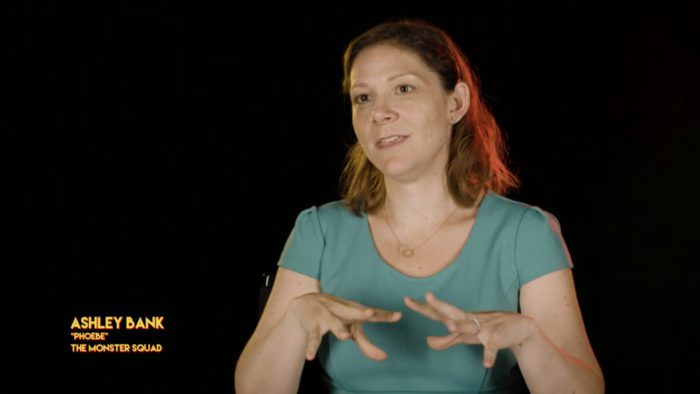Given how much I enjoy the Universal Monsters, it’s no surprise I’m a fan of The Monster Squad (1987), which I’ve written about for this site before…and on my own website. I’ve sought out screenings that I’ve brought friends to who’ve never seen it, recommended it to people, screened it myself for friends thanks to my DVD or various streaming sites, and even lent that DVD to friends (and given how hard it was to find that DVD, I need to really trust you to do that). I even play the closing credits song on my radio show, Jammin’ with Jamie, every October. The only way I could’ve been more in the target demographic for the documentary Wolfman’s Got Nards (2018), about the making of the film and its impact on those who were involved in it and on fans of all ages, is if I’d been alive to see The Monster Squad during its original theatrical run or on cable afterward.
You can stream Wolfman’s Got Nards on Tubi!
“We’re the #MonsterSquad!” #ArcLightPresents #MonsterKid pic.twitter.com/M2NbmoE0Hx
— Jamie Lee (@JackalopeJamie) October 21, 2016
My weird and winding journey to The Monster Squad involves watching Svengoolie every Saturday night, where I was introduced to so many horror and science fiction films, including the Universal Monster movies, looking up a list of the films each Universal Monster’s in, noticing one specific movie was on every list, and reading about said film until I was finally able to track it down on DVD. I sat down to watch it with my family, who hadn’t heard of it until I’d found the DVD, and new fans were made.
André Gower, who starred as Monster Squad leader Sean in the film, continues his squad leadership as the director of Wolfman’s Got Nards. Gower also serves as a writer with Henry Darrow McComas.

Wolfman’s Got Nards splits itself into clearly-labeled segments: “The Film,” “The Script,” “The Production,” “The Effects,” “The Release,” “The Discovery,” “The Cult,” “The Resurgence,” “The Loss,” and “The Impact.”
Wolfman’s Got Nards covers the timeline of The Monster Squad from its conception in the hands of Fred Dekker and Shane Black to its continued impact today. The film’s interviewees cover the cast, crew, fans, and fans who now work in film and TV. Many of the interviewees’ stories span across different periods of the film’s history, so the film has quite a bit of content over many time periods to include.
Trying to fit the film’s timeline into categories that still have lasting influence today, such as “The Film” and “The Effects,” sounds like it would muddle the timeline. The film handles this by including interviewees who are directly involved in that lasting legacy and can tie the past to the present and future. In doing so, the film allows the segments to which this applies to seep into the present and future; after these moments, the next segment “resets” the timeline to the appropriate point in the film’s production.
As the film progresses and catches up to the present, the timeline becomes smoother and smoother. I was able to follow the film’s storyline and never felt any missing patches, so, for me, this setup worked. It also helps that the focus of Wolfman’s Got Nards is on The Monster Squad’s lasting impact and that’s where the film spends most of its time, so having those elements seep into other segments throughout the film feels fitting.
While it would certainly be nice to hear more about the production process, including everything that would satisfy every Monster Squad fan would not only detract from the documentary’s focus on the film’s impact but also make the documentary hours long.
Each segment has notable and memorable moments; no segment feels like it’s unneeded or superfluous. “The Film” includes great contributions from and surrounding Mike Dillon, Ph.D., Professor of Cinema Studies at California State, Fullerton, who includes The Monster Squad in his curriculum.
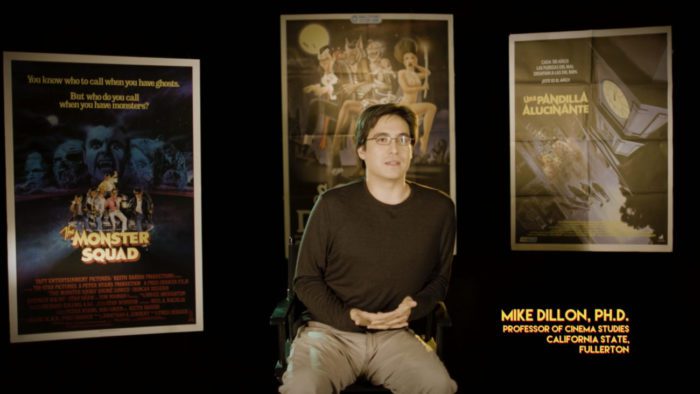
An unexpected element and highlight of “The Production” is behind-the-scenes footage showing the climactic battle sequence come together. We get to see Fred Dekker directing Ashley Bank as Phoebe, wider shots of segments that show crew members, equipment, and everything that goes into creating a film, as well as other happenings occurring between shots.
The stories you hear of the writing and production process leave you wanting to hear more. (Luckily, there are various behind-the-scenes interviews from DVD releases and other sources that can provide that.) I enjoyed hearing a bit about the casting process. We do get insight into how the film’s initial reception impacted the cast and crew immediately after its release.
I love The Monster Squad, so you may think it was inevitable I’d love this documentary. Perhaps it was inevitable that I’d at least enjoy it; however, this documentary continually surprised me, whether with unexpected interviewees, unexpected stories, or delving into topics other film documentaries may not even mention.
Wolfman’s Got Nards discusses how screenings of the film have been a driving force in bringing existing fans together, bringing new fans in, and keeping The Monster Squad in the minds of fans both “old” and new. It also takes this discussion a step further, going into the details of how a 35mm print of The Monster Squad that was found suddenly became the key to such screenings, to the surprise of its owners, Matt Pennachi and Adam Hulin, who had no idea it was so rare or in such high demand.
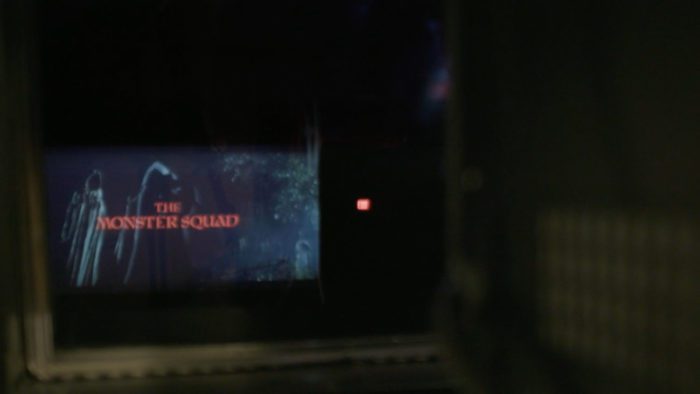
The film even goes over The Monster Squad’s journey to its first DVD release, which began, in part, because of these screenings. Nowadays, DVD and Blu-ray releases can easily be taken for granted; although, with the rise of streaming exclusives, perhaps the appreciation for physical home media releases is increasing slightly again. However, films made before DVD and Blu-ray were invented don’t automatically get a release unless the company who’d make the product knows that there’s sufficient demand. The Monster Squad had to prove itself to be “worth” releasing.
Wolfman’s Got Nards includes a lovely and moving tribute segment for Brent Chalem, who played Horace and uttered the famous line that gives this documentary its title. It doesn’t hold back. It’s clear how much those who knew Brent personally, professionally, or both have been impacted by him and feel the void he leaves.
The love for fans of The Monster Squad is all over Wolfman’s Got Nards. Not only are many of the interviewees fans, but every segment of the movie opens with fan art and prominently-displayed credit to each artist. Cast members talk about their initial shock upon hearing from fans, being invited to screenings, and having those screenings sell out.
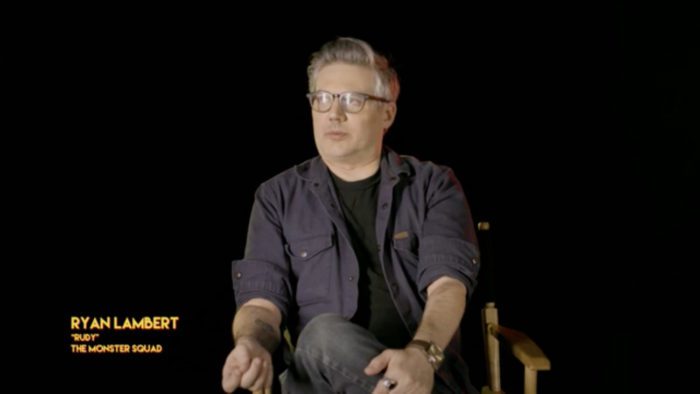
For a creative like myself, it was wonderful to see writers, actors, effects artists, and creatives of all types who were inspired by The Monster Squad, from Seth Green being inspired to further pursue his acting career in L.A. to finding out that every time someone on The Goldbergs says, “nards,” it’s a little shout-out to the squad.
Ultimately, Wolfman’s Got Nards fills in a lot of blanks in The Monster Squad’s history and also leaves you wanting more…in a good way. It makes it clear that The Monster Squad’s impact isn’t done yet, even 30 years after its original release. But the documentary doesn’t hold back on how the legacy can have a strange effect on those who were involved in the film, from the actors who wondered why this film that felt so special wasn’t advertised correctly or a bigger hit to the writer/director who openly admits to having mixed feelings about it, having poured his heart and soul into it, but having its bumpy start hurt his career.
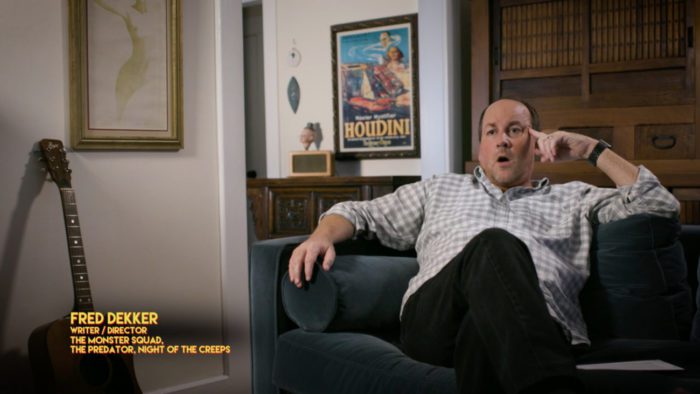
Now that we’re coming up on the 35th anniversary, hopefully, there’s even more coming down the line for the squad.
If you enjoy The Monster Squad, I recommend Wolfman’s Got Nards. If you enjoy the Universal Monsters and/or fun adventure movies, I recommend The Monster Squad. Just this February, I had another friend and colleague watch it on my recommendation and say it was “great.” The more in the squad, the merrier.
Personally, besides the continued creative inspiration for me, it made me want to watch The Monster Squad again and induct more people into the club.
